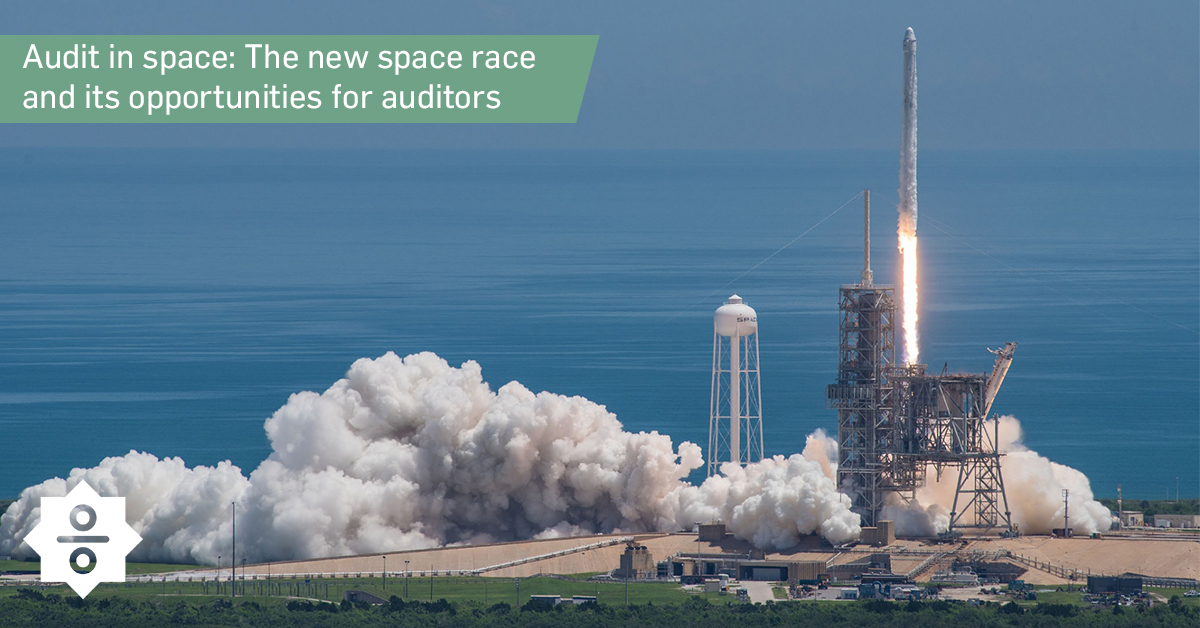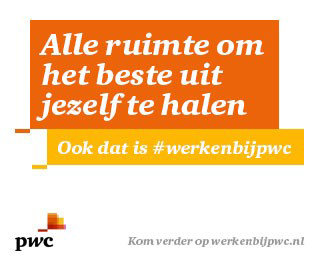For the Dutch version, click here
Over the last couple of years, more and more private entities are getting involved in the space industry. The commercialization hereof, new interests from different countries, and further innovation are spurring on new demand to explore the space industry. This demand only keeps increasing while the resources in space are limited. Because of this, a new space race is set to be taking form [1]. The emergence of this industry not only brings opportunities for new technologies, but it will also have a large impact on other industries such as accounting, taxation, and finance, to name a few [2].
Within all these industries an interesting one to look at is the auditing industry. One of the main roles an auditor is known for, is to independently give an opinion about whether companies’ financial statements are constructed with a certain level of confidence, according to the standards that it should follow.
The combination of auditing and the space industry leads us to multiple questions. How will auditing look like in the future space industry; what obstacles does it face; and how likely is it that an auditor of today, with no prior experience in the space industry, will have to audit a space company in the future?
But first of all, is there demand for audit in space?
The current space industry is said to be worth around $330 billion USD. In addition to that, the future growth rate is expected to be immense. Bank of America predicts that in 30 years this industry will be worth $3 trillion USD [3]. This figure is a result from many different sub-industries in the space industry. Aside from the popular resupply missions to the International Space Station (ISS), other sub-industries have also been around for some time and new ones are still being born. A current large sub-industry is the transportation business for satellites and other devices. This business segment uses rocket launches to take care of transportation for the satellite and communications industry [4]. This is currently dominated for U.S. launches by SpaceX (founded by Elon Musk) and United Launch Alliance (a joint venture between Boeing and Lockheed Martin) [5]. Next to this, some new markets are; space tourism (Virgin Galactic founded by Richard Branson and Blue Origin of Jeff Bezos), space manufacturing, the creation of new space stations, and mining in space [6] [7] [8].
“If future investors are willing to invest in the mining of asteroids, how would they know with certainty that these asteroids exist if most people do not even own a telescope?”
All of these ambitious projects cannot happen without facing some hurdles. To be able to bring these projects to life would require a large amount of capital from investors, and a lot of trust from clients. An important thing for investors would be to have as much trustworthy information as possible about a firm, before making an investment. Also clients such as governments from different countries would want to be sure that they are dealing with a responsible company. Both of these challenges can use an auditor to help solve them. So the auditing profession does seem to have opportunities in space commerce. Now that we know there are opportunities, what challenges can we expect these opportunities to bring with them?
How do large distances and audit independence play a role in this setting?
Firstly, a great challenge for auditors is that they are not able to easily conduct work physically in space (yet). This is due to the high costs that this incurs [9]. If future investors are willing to invest in the mining of asteroids, how would they know with certainty that these asteroids exist if most people do not even own a telescope? Since we cannot see these asteroids in person, there could be discussions whether to treat these asteroids as a non-physical asset in the audit process. Thus, the auditor would not be present to see the asset personally. The feat of auditing non-physical assets is a challenging one, and cases such as the Wirecard fraud can certainly prove this [10].
“ Just one launch may be the decisive factor of a space company being very successful or disappearing for good.”
Secondly, the audit independence will also be a great complexity, because there are not many people with industry specific knowledge in the space industry [11]. Thus, it will be hard to find someone to independently judge certain operations and who does not work for the same company. When it comes to counting inventory in space it will be expensive to send an independent auditor to do this in the first years. Because of this, more reliance will have to be put on modern technology and the integrity of astronauts. However, to get more confidence in this situation in the future, more accurate sensors and technology would have to be developed to count the assets and inventories in space. This will lead to a greater reliance on highly technical instruments that auditors will have to trust and audit as well. This will in return also push auditors to expand their knowledge in areas outside of their current field.
What role does the risk factor play when auditing in space?
If there was one thing that makes the space industry so different from an accounting perspective, it would be the amount of risks that it carries. Some consider it to be the riskiest and most difficult industry to operate in [12]. Just one launch may be the decisive factor of a space company being very successful or disappearing for good [13]. Also, just one small error with a bolt can lead to a whole rocket exploding [14]. This brings even more challenges for the audit industry to tackle. Because of the high risks, quality control is of utmost importance. To have a good overview of quality control a good internal control needs to be in place. This will prevent unauthorized personnel from making unauthorized actions and minimizing mistakes.
Besides this, because of the high risks, it becomes a very hard task for an auditor to assess if a company can continue as a going concern with sufficient confidence. This will likely be expressed with a lot of care regarding the risk that the company faces. In the onset it will be very likely that engineers and auditors will have to work closely together to conduct these assessments. As high technological complexity is involved in this industry together with high risk, assessing if a company will continue to exist in 12 months will be an extremely difficult task.
To infinity…
The importance of auditing in space is clear. For management and shareholders to make the best decisions, the most accurate and objective information needs to be available. The same counts for getting the most trust from clients. In the beginning it is more likely that auditors with former space experience will be the ones to carry out the auditing tasks, because of the large complexity of the industry. However, with time, external organizations are pushing school curricula to become more technology-oriented [15]. This can lead to the technological complexity becoming less far-fetched for the average person in the future. Also, there is more standardization arising in the space industry, and with new demand this progress will keep accelerating as well. With this the odds will become higher that a Certified Public Accountant (CPA) with no prior experience in the space industry, can start conducting these audits. Who knows, a client meeting in your lifetime might just be a rocket launch away.
References
Alewine, Hank C. “Space Accounting.” Accounting, Auditing & Accountability Journal, April 30, 2020. https://doi.org/10.1108/AAAJ-06-2019-4040.
CBC News. “Spaceflight Disasters Show It’s Still ‘very Hard’ to Get into Orbit | CBC News.” CBC News, 2015. https://www.cbc.ca/news/technology/spaceflight-disasters-show-it-s-still-very-hard-to-get-into-orbit-1.3138866.
Clark, Stephen. “ULA, SpaceX Win Landmark Multibillion-Dollar Launch Agreements with Pentagon – Spaceflight Now.” Spaceflight Now, 2020. https://spaceflightnow.com/2020/08/07/ula-spacex-win-landmark-launch-agreements-with-pentagon/.
Couronne, Ivan. “Here’s How SpaceX Went From 3 Failed Launches to Sending Humans Into Space.” Sciencealert, 2020. https://www.sciencealert.com/here-s-the-story-of-how-spacex-got-to-this-incredible-moment-in-space-exploration.
Foust, Jeff. “NASA Selects Axiom Space to Build Commercial Space Station Module – SpaceNews.” SpaceNews, 2020. https://spacenews.com/nasa-selects-axiom-space-to-build-commercial-space-station-module/.
Hadfield, Peter. “Bolts Blamed for Rocket Crash | New Scientist.” NewScientist, 2002. https://www.newscientist.com/article/dn2544-bolts-blamed-for-rocket-crash/.
Landon, Joe, and Etienne Schneider. “These 5 Industries Will Be First to Do Business in Space | World Economic Forum.” World Economic Forum, 2017. https://www.weforum.org/agenda/2017/11/industries-will-make-money-in-space/.
McCrum, Dan, Stefania Palma, and Olaf Storbeck. “Wirecard Fights for Survival as It Admits Scale of Fraud | Financial Times.” Financial Times, 2020. https://www.ft.com/content/2581fda5-8c89-46b5-9acf-ba8a88d74d88.
Partovi, Hadi. “Why Schools Should Teach the Curriculum of the Future, Not the Past | World Economic Forum.” World Economic Forum, 2018. https://www.weforum.org/agenda/2018/09/why-schools-should-teach-the-curriculum-of-the-future-not-the-past/.
Patel, Neel V. “Are We in the Middle of a New Space Race for This Century? | MIT Technology Review.” MIT Technology Review, 2020. https://www.technologyreview.com/2020/02/07/349033/are-we-in-the-middle-of-a-new-space-race-for-this-century/.
Sheetz, Michael. “Investing in Space Stocks: Guide to Rockets, Satellites and More.” CNBC, 2019. https://www.cnbc.com/2019/11/09/how-to-invest-in-space-companies-complete-guide-to-rockets-satellites-and-more.html.
Sheetz, Michael. “NASA Cost to Fly Astronauts with SpaceX, Boeing and Russian Soyuz.” CNBC, 2019. https://www.cnbc.com/2019/11/19/nasa-cost-to-fly-astronauts-with-spacex-boeing-and-russian-soyuz.html.
Sheetz, Michael. “The Space Industry Will Be Worth Nearly $3 Trillion in 30 Years, Bank of America Predicts.” CNBC, 2017. https://www.cnbc.com/2017/10/31/the-space-industry-will-be-worth-nearly-3-trillion-in-30-years-bank-of-america-predicts.html.

















